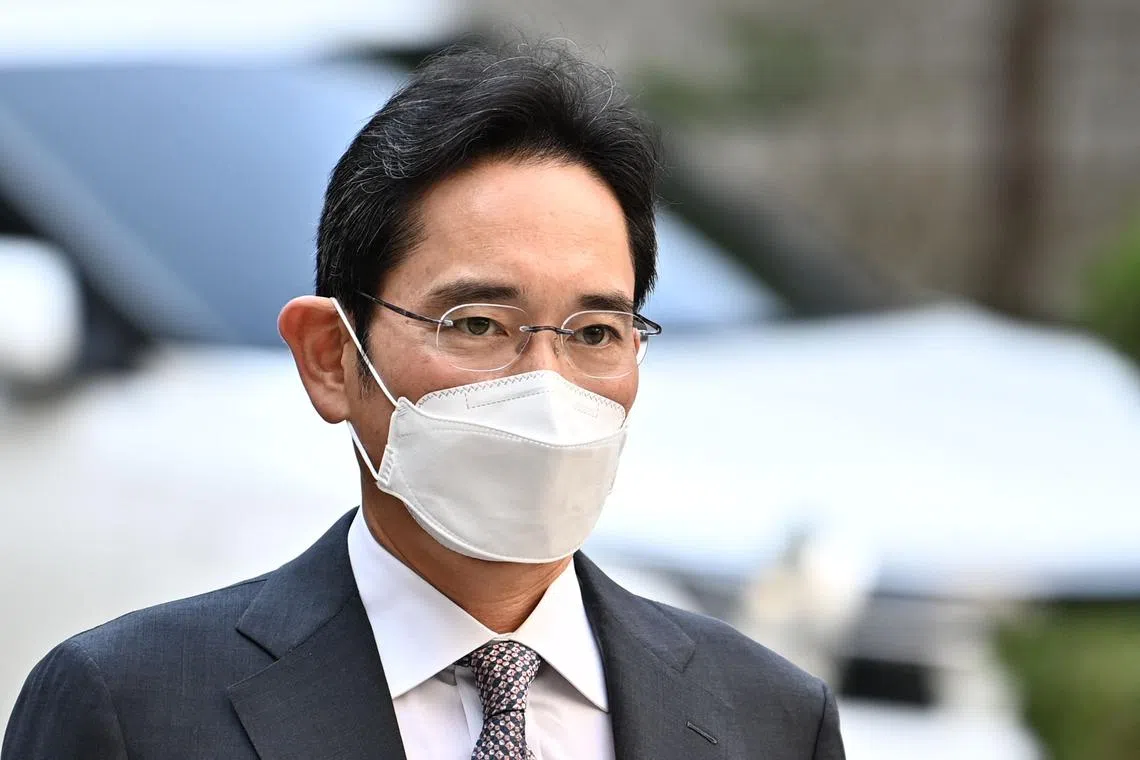South Korea’s top court clears Samsung chairman Lee in 2015 merger fraud case
Sign up now: Get ST's newsletters delivered to your inbox

The Supreme Court’s verdict permanently removes a long-running legal distraction for Mr Lee Jae-yong as Samsung plays catch-up in a global race to develop cutting-edge AI chips.
PHOTO: AFP
Follow topic:
SEOUL - South Korea’s top court cleared Samsung Electronics chairman Lee Jae-yong of accounting fraud and stock manipulation on July 17, permanently removing a long-running legal risk for the head of the country’s biggest company.
The Supreme Court upheld an appeals court’s ruling that dismissed all charges in the case involving a US$8 billion (S$10.3 billion) merger in 2015, freeing him to focus on Samsung as it plays catch-up in a global race to develop cutting-edge artificial intelligence (AI) chips.
A lower court in 2024 had also cleared Mr Lee of the charges relating to a deal between two Samsung affiliates, Samsung C&T and Cheil Industries, which prosecutors said was designed to cement his control of the tech giant.
“The Supreme Court ruling clears a layer of legal uncertainty, which could be a long-term positive for Samsung,” said Mr Ryu Young-ho, a senior analyst at NH Investment & Securities.
“It remains to be seen how directly and proactively he will engage going forward, but if the owner takes a more active role, it could allow management to focus more on long-term initiatives rather than short-term results,” he added.
Samsung Electronics shares closed up 3.1 per cent, outperforming a near-flat benchmark Kospi.
Analysts attributed the rise to the removal of legal uncertainty surrounding Samsung, as well as investors switching to the company after Goldman Sachs downgraded local rival SK Hynix, sending its shares down as much as 9.5 per cent.
The Supreme Court ruling was widely expected, but it comes at a critical moment for Mr Lee, who has faced mounting questions about his ability to lead Samsung Electronics – the world’s top memory chip and smartphone maker – as it grapples with growing competition and playing catch-up in AI chips.
Samsung’s lawyers said they were “sincerely grateful” to the court for its decision and added in a statement that the ruling confirmed that the merger was legal.
Business lobby groups welcomed the court’s decision, framing it as a stabilising development for the South Korean economy.
The Korea Enterprises Federation said the ruling removes a major legal burden for Samsung and comes at a time of intensifying global competition in high-tech industries like AI and semiconductors, as well as economic pressure from US trade tariffs.
“Samsung’s role as a leading South Korean company is more critical than ever,” the group said in a statement. It said it hoped Samsung, under Mr Lee’s leadership, would step up investment and innovation, helping to create jobs and bolster South Korea’s economic rebound.
Mr Lee, 57, spent 18 months in jail for bribery in a separate case related to former president Park Geun-hye. He was later pardoned by then President Yoon Suk Yeol, with the Justice Ministry citing a need for the billionaire businessman to help overcome a national economic crisis.
The family-run conglomerates, or chaebols, have long been revered for helping transform South Korea into a global economic powerhouse, but also criticised for opaque dealings and for stifling small businesses and start-ups.
Earlier in July, Samsung projected a worse-than-expected 56 per cent plunge in second-quarter operating profit due to weak AI chip sales, deepening investor concerns over the tech giant’s ability to revive its struggling semiconductor business.
Mr Park Ju-gun, head of corporate analysis firm Leaders Index, said Mr Lee now faces the dual challenge of tightening his grip on the conglomerate while steering Samsung back to leadership in key sectors.
“He must both defend Samsung’s core businesses and find new growth engines, all while consolidating his control,” he said. REUTERS

